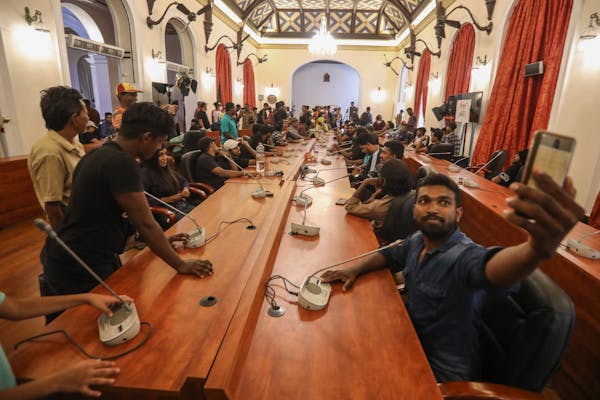Sri Lanka is confronting its most horrendously awful financial emergency in current history. Its 22 million in number populace is battling with immense cost increments for food, power, drugs and different necessities. That is in the event that they can get them by any means, with private drivers going through hours lining for their fuel amount.
To this end Sri Lankans have been fighting in the city and raged the President's House.
How could it work out like this?
The prompt reason for the emergency is direct: Sri Lanka ran out of unfamiliar stores, the monetary standards its administration and residents need to pay for imports.
How it got into this present circumstance requires more clarification. It's an account of financial lack of caution, unreasonable swapping scale strategy and persistent bungle.
Running out of unfamiliar cash
Starting from the start of 2020 Sri Lanka's interest for unfamiliar cash has expanded while its capacity to acquire unfamiliar money - through products, credits and other capital inflows - has declined.
This is reflected in the consistent decrease in true unfamiliar stores held by the Central Bank of Sri Lanka, tumbling from about US$8 billion to under $U2 billion. (The Sri Lankan cash is "shut", meaning it isn't exchanged external the nation, so unfamiliar trade exchanges need to go through the national bank).
As awful these figures are, actually more regrettable.
Gross stores aren't equivalent to cash in a financial balance that can be utilized for installments. They incorporate, for instance, money previously dedicated to installments, and credits with conditions that cutoff imports from specific nations.
The real measure of "usable" unfamiliar cash is less. By early May it was scarcely US$50 million - a miniscule level for an economy that toward the finish of 2021 required about US$75 million per day to pay for imports. This prompted Sri Lanka's administration defaulting on a US$78 million interest installment in late May.
Declining money inflows
Sri Lanka's declining unfamiliar cash inflows and expanding surges are because of imports dominating commodities, Sri Lankans abroad sending less cash home, the obliteration of the travel industry area and higher obligation reimbursements.
In two years Sri Lanka's yearly import/export imbalance has move from about US$6 billion to US$8 billion.
Two other key wellsprings of unfamiliar cash, cash sent home by Sri Lankans residing abroad and worldwide the travel industry, were likewise hit hard.
At their pinnacle, they more than offset the import/export imbalance for merchandise.
Yet, starting around 2019 the worth of settlements has fallen over 20%. Pay from the travel industry, crushed by the 2019 Easter bombings in which 269 were killed, has dropped practically 90% from its 2018 pinnacle.
Setting up the swapping scale
Commonly a country can try not to run out of unfamiliar money in two ways.
One way is to acquire cash. Sri Lanka, be that as it may, was at that point vigorously in the red before this emergency. Progressive state run administrations acquired to back foundation tasks and prop up misfortune disclosing utilities. With assessed yearly obligation administration expenses of US$10 billion, Sri Lanka is presently a terrible wagered for loan specialists.
The second, and better, way is a drifting conversion standard as per those in Australia, Britain, Japan and the United States.
A drifting rate assists with adjusting exchange esteem on the grounds that the money's worth changes as per request.
In fact Sri Lanka has a drifting cash, however it is a "oversaw float" - with the public authority, basically through the Central Bank of Sri Lanka, fixing and repegging the rupee's worth to the US dollar.
An administration can do various things to keep up with the worth its monetary standards, however the fundamental way is purchase the actual cash, utilizing unfamiliar stores. Sri Lanka's national bank did this.
As unfamiliar stores ran down, the public authority embraced other less secure arrangements. Especially appalling was the April 2021 choice to boycott manure imports.
This was showcased as a strategy to advance natural cultivating, however it was tied in with cutting interest for unfamiliar cash.
The resulting drop in horticultural creation has just intensified the financial emergency.
Rising costs
Similarly as transient arrangements can make longer-term issues, so too can long haul arrangements mean momentary torment.
Permitting the (fixed) rupee to devalue over 40% against the US dollar has pushed up expansion to 54%.
The assistance the Sri Lankan government is looking for from the International Monetary Fund is probably going to hit individuals hard, in some measure at first.
In light of previous experience, the IMF will need significant responsibilities on government consumption and other financial markers prior to rescuing Sri Lanka.
Yet, without activity, life in Sri Lanka looks considerably more terrible.
With deficiencies of imported natural substances, modern result will contract, making a descending twisting of low result, low speculation, and resultant low monetary development.
Then again, Sri Lanka enjoys a few regular benefits - from its normal magnificence to the most proficient populace in South Asia. What it needs presently is principled political authority, skillful financial administration and the right approaches.

0 Comments